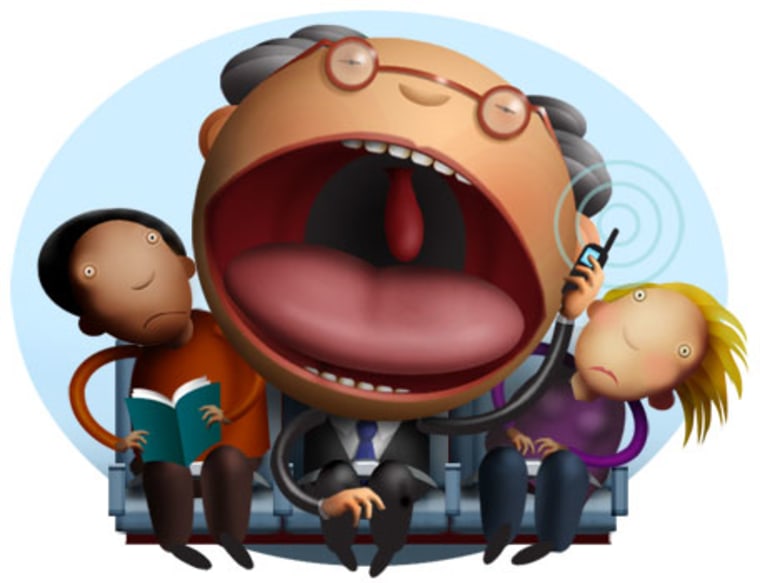When will we be able to make and receive calls on our cell phones on an airplane flying over the United States?
Maybe never.
The likelihood of cell-phone use on planes was dealt a setback recently as members of the House Transportation and Infrastructure Committee approved a bill — by voice vote — that will permanently uphold the current domestic ban.
House members shared their horror stories before upholding the ban.
“I do believe this is important that we don't make what is already a crowded and difficult environment for the traveling public and flight attendants” worse by allowing cell phone use in-flight, said Rep. Peter DeFazio, D-Ore., sponsor of the Halting Airplane Noise to Give Us Peace (HANG UP) Act.
But Rep. John Mica, R-Fla., said there are a lot of annoying things on airplanes, including children with dirty diapers and noisy MP3 players, but that doesn't mean they should be banned.
"You are trying to legislate courtesy, folks, and that just doesn't work," Mica said.
Are air travelers solidly behind DeFazio and his "hang up and fly" buddies on this one?
Advocates of the HANG UP Act claim consumers are overwhelmingly opposed to having cell phone service on airplanes. As proof, they point to a poll sponsored by the Association of Flight Attendants-CWA and the National Consumers League. In that survey, 63 percent of those polled were against in-flight cell phones, 21 percent were in favor of allowing the calls, and flight attendants in general were concerned about having to be the ones to referee disagreements they were sure would erupt if phone conversations were permitted.
However, that survey was conducted in 2005, when "just" 69 percent of the U.S. population had cell phones. At the end of 2007, more than 84 percent of the U.S. population had the devices and they were using them in more and more places.
Should that include airplanes?
Gregg Stebben, the Chief Internet Evangelist for PC Pitstop.com, says the in-flight cell phone issue isn't really a new debate, just a natural extension of the conversation our society has been having for years now about how we get along — or not — on buses, subways and other forms of public transportation.
When it comes to using cell phones on airplanes, his initial response is, “Look, it's a technologically advanced world” and business travelers especially would love to be able to use cell phones to conduct business on airplanes, no matter what it costs. “But while I'd like to be able to use my cell phone on an airplane,” he says, “I don't necessarily want to hear other people chatting away on their cell phones” in seats nearby.
Stebben and I tossed around a few scenarios for how in-flight cell phone service might work. Perhaps there should be strict limits on the number of cell phone calls that can be underway on an airplane at any one time. (Right now, it appears to top out at six on the Air France test flights.) Maybe anyone making a cell phone call should be required to use a headset. Or maybe there should be time limits on all calls, quiet times when no calls can be made at all, and/or special areas on the plane (i.e. phone booths) that are set aside for chatting.
Stebben is sure that in-flight cell phone service will become available, sooner or later, on commercial flights in the U.S. When it is, he hopes each airline is allowed to decide for itself whether or not to offer the service to passengers — and he hopes travelers will have a choice about whether or not to fly on airplanes equipped with cell phone service. "In fact," he says, "If I was booking a flight and it was going to cost me $50 extra to be on an airline that didn't allow cell phone calls, I may be willing to pay that extra fee."
There's no turning back
Rich Ling also views in-flight cell phone service as already way beyond the "should we have it?" phase. Chatting with me from his home in Norway, the author of “New Tech, New Ties: How Mobil Communication Is Reshaping Social Cohesion,” Ling said, “We really can't say, 'No telephones.' People's desire to use the phone on the plane is not going to go away. We're just going to have to work it out amongst ourselves. That's why we have the rules of etiquette and courtesy.”
For years now, Ling has been studying how society is adapting to mobile phone use. In fact, in 1997 he published a paper about the use of cell phones in restaurants and other "inappropriate situations." Several people he interviewed for that study mentioned airports, trains and buses as places where they considered it inappropriate to use cell phones.
Now, of course, unless you're one of those LOUD TALKERS, no one really gives a hoot if you use your cell phone in an airport, on a train or on a bus. Ling says that's an example of society's shifting rules about technology. It's also why he's sure travelers will eventually work out the rules for in-flight cell phone calling. "Talkers will need to use discretion. People around them will need to have a little tolerance. And everyone should learn to text, text, text. There may be some heated situations that come out of it, but we're going to work it through and learn when, and where, and how it's OK to do this."
And how long will it take to work it out? Rich Ling says, “You can't do it right away. We're talking years, not months.”
To that, Greg Stebben of PCPitstop.com says, “I think now is a great time to invest in a good set of noise canceling headphones.”
The Associated Press contributed to this report.
Harriet Baskas writes msnbc.com's popular weekly column, The Well-Mannered Traveler. She is the author of the , a contributor to National Public Radio and a columnist for USATODAY.com.
